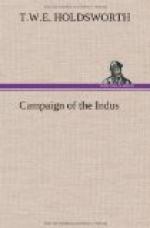Ever your affectionate son,
T.W.E. Holdsworth.
LETTER IV.
Camp, near Jarruk, on the banks of the
Indus,
Twenty miles from Hydrabad,
January, 31st, 1839.
My dear father,—I had fully intended this letter for Kitty, but such a dreadful event happened in our regiment yesterday, that I was afraid, if she was at all unwell when she received the letter, connecting it, as she would, with me, it might throw her into some dreadful fever, or something of that sort. I have very little time to write, as the post leaves this, by steamer, at three o’clock to-day; and I have a great deal to do during the day. I think it my duty, however, to write, as the report of the circumstance might get into the papers without mentioning names, or giving wrong ones, and you might be needlessly alarmed.
To strike at once in medias res, this event is no less than the horrible death of three of our officers in a burning shikargur, or large thicket, enclosed by the Ameers for the preservation of game. The names of the poor, unfortunate fellows are Sparky (whom, by-the-bye, you might have seen at Chatham,) Nixon, and Hibbert. The two first, Lieut. Sparke, in the Grenadiers, and Nixon, in the Light Company. Hibbert was assistant-surgeon. They were three of the finest hearted fellows: Nixon, a long time one of my fellow subs in the Light Company. (I can hardly write, my hand shakes so.) Poor Hibbert was an exceedingly clever fellow, and a great traveller, and one of the most beautiful draughtsmen you could meet with any where. They are all three a terrible loss to our corps. I will tell you the mournful tale as it happened. We arrived here on the 25th. I breakfasted on Tuesday with them at mess, which was the last time I ever saw them alive: they were in exceedingly high spirits. The success of an enterprise the day before appears to have determined them to go upon another expedition on this day, which at first sight did not appear half so hazardous as it unfortunately proved to be; this was no less than going into a shikargur (of which I have explained the meaning above) about four or five miles in the rear of our camp, and which was supposed to be well stocked with game. It happened that this jungle had been set on fire about two days previously, most likely by some of our camel drivers, or other native followers: some said it was done by the Beloochees; but this I think very unlikely, as it is dead to leeward of our camp. Well, they did not appear in the evening, and we began to be rather alarmed on their account: however, we thought they would turn up by some chance or other. Next morning (yesterday), when the regiment fell in, an hour before daylight, which the whole camp does here every morning, as we are supposed to have a hostile force not very far from us, they were reported absent. Breakfast came; no tidings of them: ten; eleven o’clock; and they




